
The Difference Between Difficult and Toxic People
There are difficult people and then there are toxic people. Nothing is more annoying than someone who tells you, how to handle a toxic person in your life in the same way you would a difficult person. They are not the same and you cannot handle them the same way, unless you are interested to being hurt in unending ways!
Not everyone who is difficult is toxic. I believe that there are degrees of difficult that can lead to toxic. Also, I think that some people are more toxic with some people than they are with others. Perhaps this is because you teach people how to treat you by what you are willing to endure.
Difficult people often understand boundaries, toxic people don’t.
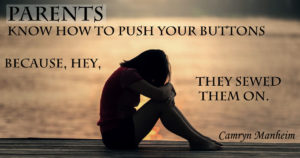
What you find difficult in people can be different for everyone. Someone might be hard for you to get along with because they just annoy you. They seem to know what bothers you and they do that. The person always seems to know how to push your buttons. Or perhaps, they have a characteristic that reminds you of someone or an experience you had, that was unpleasant and not wanting to be hurt again you put up walls and don’t get a long with that person.
Difficult VS Toxic
There are some crossovers between difficult and toxic people. The biggest difference is how your boundaries are respected and how much they affect your life in a negative way. Any difficult behavior can become toxic if it isn’t kept in check or proper perspective. For example: someone who is flakey is not a reflection of you; it is a reflection of the flakey person. If you are internalizing their flakiness than you allow their behavior to become toxic in your life. If you keep proper perspective, you understand it is merely a reflection of the flakey person and know you cannot count on them because they obviously have their own issues they are dealing with.
Difficult
- Gets a long with most people
- Rubs some people the wrong way- may not understand or recognize social cues.
- Takes over- monopolize, always the center of attention
- Complains about everything
- Won’t return phone calls, e-mails, text, etc.
- Won’t commit to anything
- Doesn’t take responsibility
- Tells a lot of “white lies”
- Tends to say what you want to hear
- Ungrateful
- Unappreciative
- Uncooperative
- Insensitive
- Upsets people and is over truthful- “I’m just saying the truth” It’s what I see/believe to be true” (If this behavior is frequent it quickly can become toxic.)
- Is rude, but thinks it is okay because they said it with a smile on their face (Can easily become toxic)
- Say you are oversensitive if you don’t think it is funny
- Demanding
- Flakey
- Inconsistent
- Like to see people squirm (button pushers)
- Drama
- Critical- points out others faults and failings
- Doesn’t ever want to hear about your life, but will tell you all about theirs
- Meddle
- Competitive
- Poor communicator
- Usually has limits and boundaries and will respect yours
Toxic
-
- Abusive
- Controlling
- Easily angered
- Bully behavior- jokes and demeaning/belittling
- Has addictions
- Never accepts responsibility (blames everyone else)
- Gossips
- Negative
- They are always the victim (almost always in a crisis)
- Narcissistic
- Always Right- won’t listen to another point of view
- Lies, manipulation
- Problem makers – they enjoy seeing others squirm
- Unreasonable
- Twist your words, confuse you
- Often have ulterior motives
- Have a personality disorder
- No boundaries
- Leaves you feeling worn out, unbalanced and bad
Wonder if you are difficult?
Here is a link to a quiz:
Quiz about whether you may be the difficult one to get along with. https://www.psychologytoday.com/blog/the-happiness-project/201004/quiz-are-you-the-one-everyone-finds-difficult
How to deal with difficult people
Boundaries
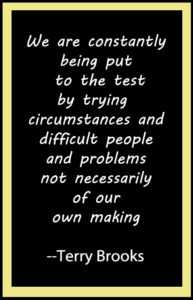 1st you teach people how to treat you by what you are willing to put up with. If you have no boundaries, you will be walked all over! Without boundaries it is a matter of time before that relationship becomes toxic.
1st you teach people how to treat you by what you are willing to put up with. If you have no boundaries, you will be walked all over! Without boundaries it is a matter of time before that relationship becomes toxic.
Typically, difficult people don’t want to be difficult. They need to know what the “rules” are and those that are truly your friend will respect those rules.
Boundaries are set by saying things like “I don’t like gossip, let’s talk about something else”, telling them when something isn’t funny, telling them when they have hurt your feelings, telling them what you expect from them, etc.
My experience with my ex-mother-in-law
My husband’s ex-step-mother was a very flakey person. We knew not to count on her for anything! The biggest problem came when she would make promises to my kids and not follow through. I had a frank discussion with her about not telling my kids about “gifts”. If she gave something to them then great but don’t tell them you are going to get them something and then not do it. Also, don’t get them excited about your next visit and keep cancelling on them. This kind of thing colors a kids world in ugly colors of disappointment by the people they should be able to trust and count on.
After our talk she was better about not building the kids up for things she may or may not do. Not perfect, but better. We would have to remind our kids that sometimes grandma has good intentions but things don’t always go the way she has planned.
More strategies
- Keep your cool– Don’t allow them to drag you into an argument or into their negativity.
- Stay rational and don’t spiral with them– many tend to get more ramped up when they are joined in their behavior whether it be gossip, negativity, complaining, etc. Don’t just agree with them to get them to go away, it doesn’t really help anyone.
- Don’t keep quiet – This can be a sin of omission. Quietness often conveys the message that you agree. This encourages them to keep going. If you agree with part explain what you agree with and what you don’t agree with. “I can agree with you about ________, but I disagree about the rest or the way you are going about it.”
- Avoid touchy topics– religion, politics or other subjects you know you don’t agree on
- Recognize who they are– more importantly, remember who you are and don’t sink to their negative behavior
- Boundaries– it’s worth repeating. Tell them you want to be treated better if you are going to be friends.
- Give the benefit of the doubt– when possible. Fore example: just because they always complain doesn’t mean they don’t have legitimate concerns or problems. Perhaps complaining is the only thing they know how to do. It’s possible they don’t feel heard and so they keep complaining hoping someone will finally understand.
- Listen– like the above, they may not feel heard. Ask questions and do some reflective listening.
- Problem solving– No one likes someone to come in and solve their problem, but if you can help lead them to a problem solving way of thinking it can diffuse the difficulties. For example: What can you do? What can you change? What do you have control of? It can help them get a better perspective of the situation.
- Just the facts– get down to the facts and away from all the emotions. It often helps them to get a better perspective.
- Change the subject, walk away– try to distract them away from their negative behavior. If they keep going give a time limit or . Make sure before you walk away or become blunt that you weren’t encouraging them to keep going: being silent, not asking questions, not listening, joining in the negative talk, etc.
- Be polite– I have always told my kids to be kind, but not everyone has to be their best friend.
- Stay positive
- Have a sense of humor– without cutting down or having other difficult behaviors, humor can help set boundaries or deflect and/or diffuse a negative situation.
- Set a time limit with them for how long they can vent to you
- Get distance or minimize contact– this is when things are a little caustic and may be turning toxic. It may be that they are going through a lot of difficult things in their own life and don’t know how to handle it. Or they may not be respecting boundaries. Sometimes after a little distance things will improve. You may find that once a month or so you really enjoy being around this person and the distance helps you to better handle the difficulties.
How to deal with Toxic people
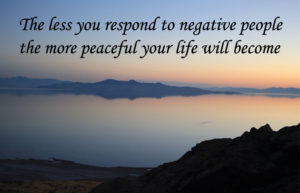 Boundaries have always been a difficult thing for me, because I grew up with a mother that did NOT believe in them. With the help of a counselor I set some boundaries, which allowed me to have a good relationship with my mom, for a while.
Boundaries have always been a difficult thing for me, because I grew up with a mother that did NOT believe in them. With the help of a counselor I set some boundaries, which allowed me to have a good relationship with my mom, for a while.
My mom and I were able to talk more, because I avoided subjects that were difficult. Evidently, this gave her a false sense of security because she thought we could talk about everything. I knew I couldn’t tell her that I was avoiding certain topics, she would simply not understand.
Eventually, I made the mistake of telling her I had set boundaries. This led to her calling me a liar and it didn’t matter that we had been able to have a better relationship than before. Toxic people often do not understand or accept boundaries.
Strategies with toxic people
- Boundaries– may or may not work and you have to remain firm. They will push and test those boundaries frequently and resent having boundaries. They may not recognize the boundary. Or like my mom, think boundaries are unnecessary for a relationship. That boundaries somehow stifle a relationship and it is based on a lie.
- Your boundary may include you leaving when certain things are said or done. In other words, it may take more actions than words to inforce your boundary.
- Minimize interactions with them– in some cases this may need to limit interaction.
- Stay with fact based communication– remember that unreasonable people do NOT care about YOUR feelings or perspective
- Be kind– you won’t regret being kind, most of the time. Toxic people will often accuse you of being and doing what they are doing. The kindness is for yourself. You will feel better about yourself if you don’t stoop to their level and join in the negativity. However, keep in mind that even when you are kind they will call you unkind. It is part of keeping you off balanced, frustrated, and putting blame on you. Kindness can be firm and truthful without being a doormat.
- Don’t drink around them– makes you vulnerable to attacks and takes your guard down
- Don’t give a lot of information about yourself– center conversations on them. If they are the type who look for ammunition to use against you next time, the more things center around them in your interactions, the less they have to use against you. (It doesn’t mean that they won’t make something up or exaggerate a small incident that would have meant absolutely nothing to a reasonable person.)
- Don’t expect them to be someone they are not or to one day turn into the person you hoped to have in your life
- Steer away from “dangerous” topics (boundaries)
- Understand that they will never see your point of view and trying to do so will bring you more hurt and frustration-know who they are, they most likely are NOT going to change.
- Have something or be somewhere that there are distractions- distractions can help you keep your cool and keep perspective. They can also give you a quick “get away” from topics or discussions that should be avoided. Distractions like: playing with a pet, looking after a toddler (this one worked well for me, until they weren’t so little anymore), helping in the kitchen, playing a game, or have something for them to be involved in (game or a job that needs to be done).
- Don’t allow abusive behavior of any kind and don’t fall in to the trap of “normal”– if their normal is abusive and you just blow it off you are allowing them to make you their victim.
- Find a counselor– a counselor can help give perspective and help you sort out what is truly “normal” and what isn’t. Many toxic people get into your head and can make it feel muddled and confused. Having a third party can bring clarity, give you tools, and strength to either carry on with the relationship or to escape it.
- Cut them off– Sometimes it is necessary to cut ties with toxic people, regardless of what their relationship is to you. If you have been abused by them and the abuse continues, you may only be able to heal by having them out of your life. Is this relationship affecting your life in lots of negative ways? Is all of your energy tied up in this relationship? Does it leave you depressed and without any energy for anything or anyone else in your life? It may be necessary to consider this step.
All who are abusive, are toxic
In my opinion, all who manipulate and lie are toxic. You can’t have a real relationship with people you can’t trust. You can’t have a real relationship with people who don’t respect you.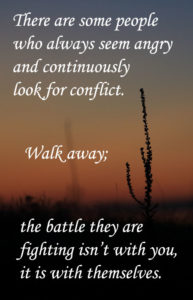
Find more memes about dealing with difficult people here.
Resources
https://www.crosswalk.com/faith/women/how-to-protect-yourself-from-these-10-toxic-people.html
https://www.verywellmind.com/reduce-stress-conflict-difficult-people-3144965
https://www.forbes.com/sites/kevinkruse/2013/06/25/dealing-with-difficult-people/#d0e010322740



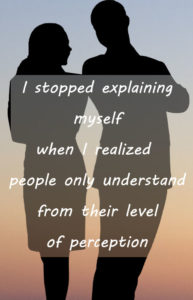
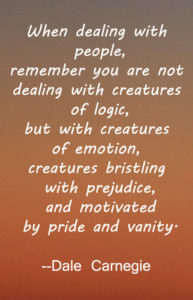
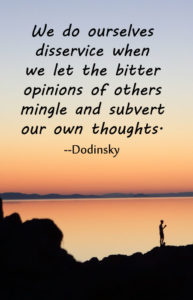
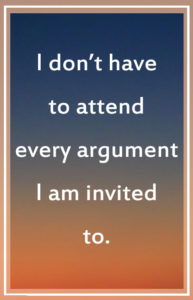


Recent Comments